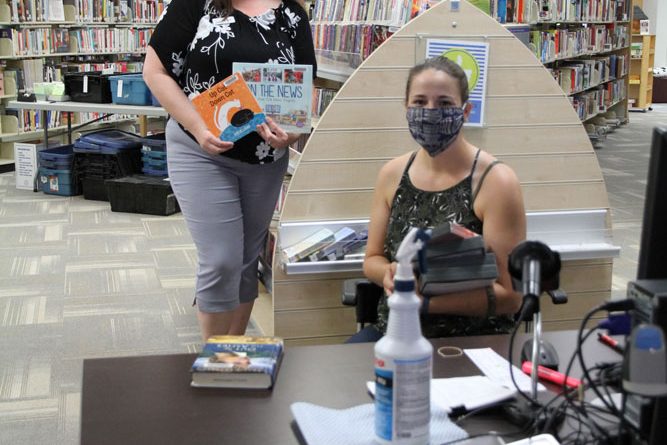Strathmore library opens with new safety protocols
By Sean Feagan, Local Journalism Initiative Reporter

The Strathmore Municipal Library reopened this past Tuesday, with new hours of operation and new safety routines in place.
Neighbouring village libraries, meanwhile, are working to reopen once they have a plan in place to ensure safety for their patrons.
Marigold Library System is responsible to determine how each library in its system will roll out. According to Michelle Toombs, CEO of Marigold Library Systems, libraries must determine staffing levels, library access and seating, how materials and equipment will be sanitized, and how returning materials will be quarantined.
“As a result, even though it may be okay for libraries to open from the relaunch planning point of view, that’s not what we’re hearing and not what we’re seeing,” said Toombs. “We’re seeing that libraries are taking this one careful step at a time.”
Many libraries within the Marigold System have taken an interim step towards reopening by offering curbside pickup of physical library materials.
“Some libraries have been doing this for a while, like Strathmore, for example,” said Toombs. “But some of our smaller libraries, as they transition and prepare for reopening, have decided that curbside pickup is manageable, is safe and is something that can be done with the staff complement that is available.”
Marigold has restarted its delivery system and is about to reinstate the sharing of resources between libraries at a provincial level.
“Once we are able to do that, there will be a lot better access to the materials that people want in a physical format,” noted Toombs.
Throughout the shutdown, libraries across the province saw a spike in membership, which was helped by new, remote ways in which the public can get library cards. Since March 17, when libraries closed in accordance with the provincial public health order, 19,000 Albertans acquired library membership, including 2,000 new users in the Marigold system, said Toombs.
These memberships were driven by people looking to access virtual resources that are “vast and amazing,” she added. “When people are aware of what those digital services are, it’s quite a vast array of really great services.”
The library’s virtual resources include eBooks, audiobooks, online magazines and newspapers, language learning software, and digital platforms such as Ancestory.ca (a family history resource) and Lynda.com (an instructional resource).
The use of these virtual materials has subsequently spiked during the pandemic. The use of eBooks has increased by 200 per cent and the use of online learning digital tools has increased by 250 per cent in Alberta, as reported by Diana Davidson, director of the province’s public library services branch. Indeed, the use of Ancestory.ca through libraries has increased by 500 per cent since the closures, said Toombs.
One silver lining of the pandemic was that more people have been introduced to the online materials that Marigold has to offer, said Laura Taylor, Marigold’s deputy CEO.
“This really was an opportunity to remind the public that there were still a lot of great resources available at the library and that we were open 24/7, virtually,” said Taylor.
The trend will remain past the pandemic, added Toombs. “We are going to see that use continue beyond when libraries open their doors.”
These online resources have been instrumental in helping parents manage homeschooling, said Toombs. “Online learning tools have been discovered and have been very good for supporting parents,” she said. “But it’s not just for kids, it’s for adults too – there’s lots of learning that can continue across all ages.”
Marigold’s has offered online programming throughout the pandemic, as it has done for some time. “Marigold has always developed certain programs that we often do virtually to make sure we can reach some of our communities where it is more difficult to get to a library,” she said. One June 15, Marigold launched marigoldprograms.ca, a website featuring programs and activities for children, teens and adults.
Taylor is leading a virtual initiative throughout the province, the Summer Reading Program, for rural libraries to have access to creative online programming. The program, which features weekly themes, uses Google Classroom to post live events, activities, book recommendations and crafts. It is available for five age classes (ages 3 to 5, kindergarten to Grade 1, Grades 2 to 4, Grades 5 to 7, and teens). Each week has a theme and will feature a celebrity guest recording, including sports figures, authors and notable people in the community, such as provincial political figures, said Taylor. The program is being promoted with the hashtag #absrc2020. The program is free, but a $5 donation is encouraged.
“We did this in association with the Alberta Virtual Summer Reading Club, with our seven regional library systems,” said Taylor. “It’s pretty exciting.”
